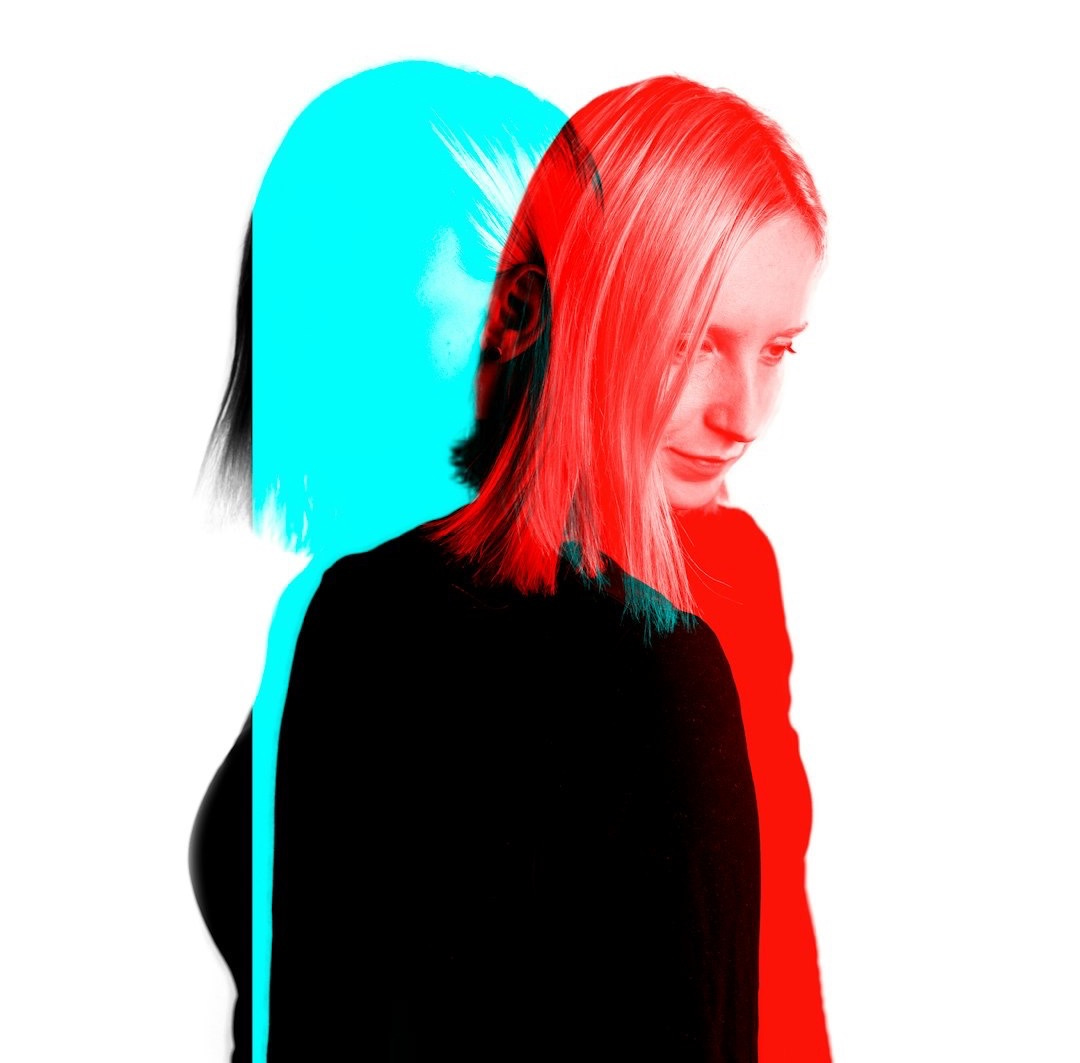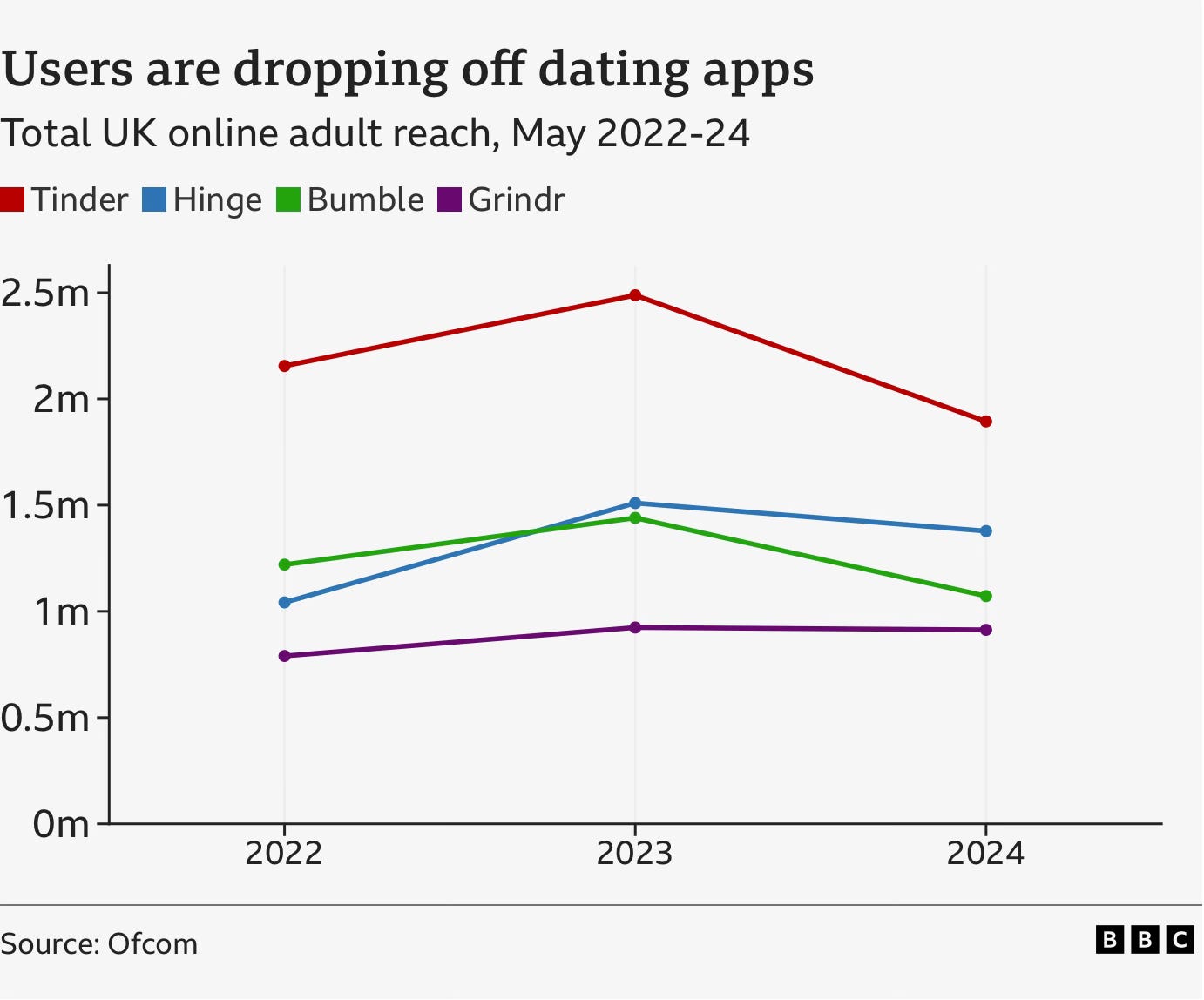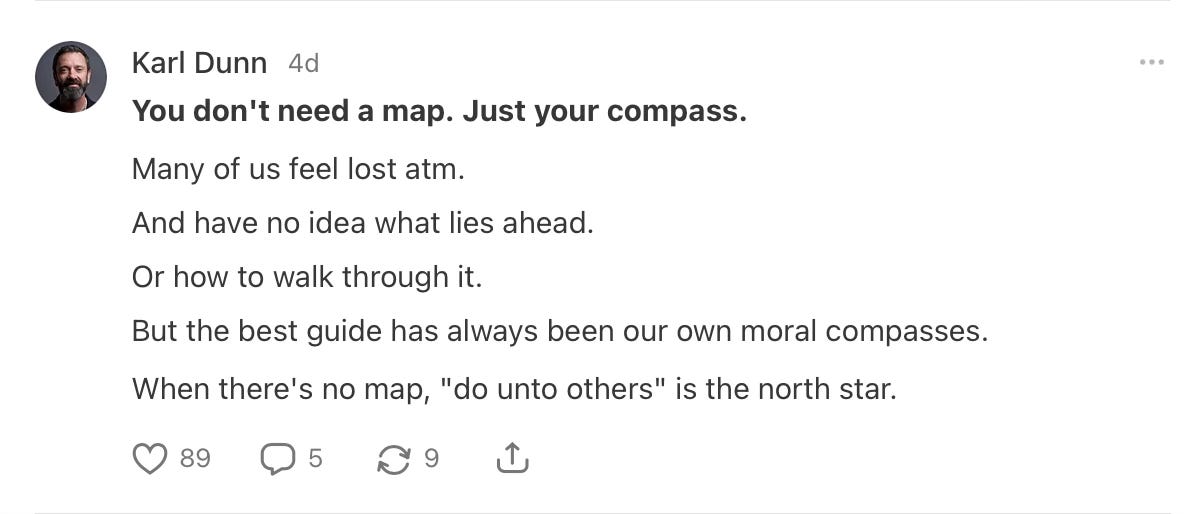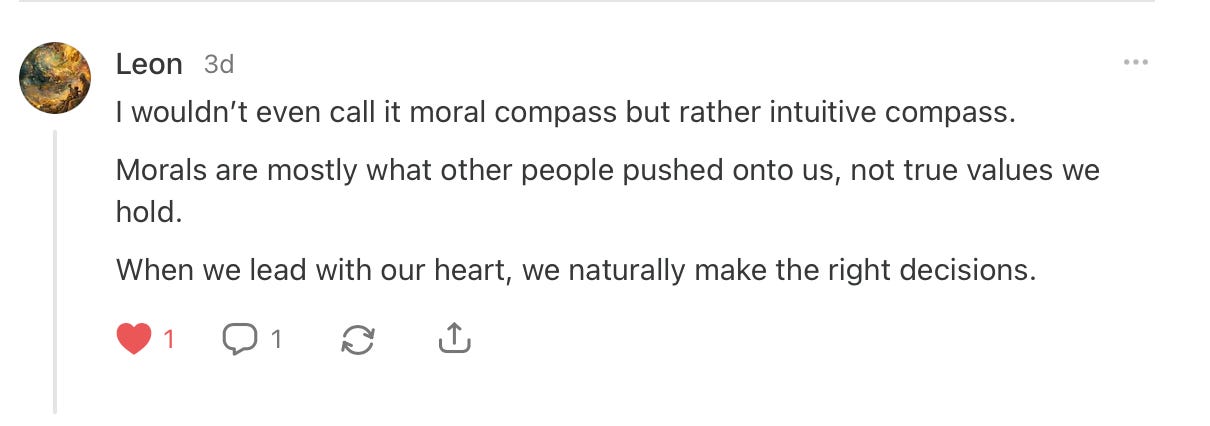We're All Villains In Someone Else's Dating Story - Undividing #18
Plus Our Intuitive Compasses, And An Advertising Campaign About Finding Common Ground.
Welcome to Undividing where we are reconnecting a divided world
Hey there everyone,
As someone who wrote a book on their divorce, went on a whole journey to self, and then met my life partner after that, I get asked a lot about dating advice. That and I’ve been dating for about 35 years of my life.
What I’ve noticed in conversations is that people are leaving the apps in great numbers. So I thought this week we’d do a change of pace and talk about all the divisions in dating and in particular why we’re having app burnout. Inevitably, it springs from divisions in ourselves.
In Undividing #18 we’re diving into:
Undividing Our World - People are leaving dating apps. Where are they going? And why?
Undividing Ourselves - I got an update on my idea of my own moral compass.
Undividing Extras - Every now and again, advertising adds something incredible into the world. Here’s my favourite campaign of all time.
Let’s get undividing!
Undividing Our World: We’re Falling Out Of Love With Dating Apps
Pieter is a guy I used to hang out with in Berlin. Single like me, we would meet once a month to have dinner. At least, that was the premise.
Because somewhere between entrees and main course one of us would ask, so have you met anyone interesting lately? And the dating-disaster story dam would break.
Our stories followed a similar pattern. Here’s us as good people, hurt but optimistically there on the apps, when suddenly a message would pop up. They would seem cool, interesting, available. The texts would lead to the idea of getting together.
Then it would all go horrible wrong. They wouldn’t show up, they’d ghost, they’d cancel at the last minute. Or if they did turn up, they’d look nothing like their pictures, or a totally different personality in person than online. Or, my favorite, they’d get to date three before mentioning that they had a partner and that they’re open, “Is that not on my profile?”
So I was telling Pieter about a guy I’d met called Chris who I thought was really cool. How it had started well. We’d been out on for a coffee, had a great chat, and a little kiss goodbye. Then I told Pieter about how a couple of days later, Chris had extended a last minute invite to a drinks thing with his friends.
I only found out when I arrived that it was Chris’s birthday. He’d left this detail out. Pieter made a face. Anyway, I said, we sat there in this bar, Chris with his arm over my shoulder for most of it.
But every ten minutes, the arm came off so he could text angrily. When I asked Chris what was bothering him, he eventually told me that this guy he was dating had texted a couple of hours ago to say he wasn’t coming. But by his IG this guy was clearly out with some friends, and that he, Chris, was really upset about it.
Pieter looked at me in disbelief, “Wait, so you were the backup? The armrest, so that he didn’t have to be there on his own.”
We both agreed what a dick this guy Chris was. So I explained how I carried on, left an hour later, said goodbye to Chris, then took his number out of my phone.
I continued telling Pieter how two weeks later Chris rang me to let me know that he and this guy have broken up. And wanted to know if I’d fancy heading out for a coffee like right now.
Against all my better judgement, I said sure. But how then in the process of this phone call, he’d decided to stay at home and clean his apartment instead.
Pieter’s jaw hit the table. “Are you f’ing kidding me? He chose housework over meeting you, when he rang you?”
Pieter demanded to see a photo of who this idiot was, so I pulled up Chris’s profile on the app Scruff. That’s when Pieter’s face completely changed from solidarity-like anger, to confusion.
“Wait a minute, that’s Chris! That’s my best friend!”
“Well, I said, your best friend is a dick.”
“You can’t talk smack about my friend like that, he’s a really good guy.”
“Here’s the difference Pieter. You’ve got best friend Chris, I got Scruff Chris. They’re not the same person.”
The rest of the dinner was weird. As we left, I saw Pieter pull out his phone. Probably to call Chris. Needless to say, I never saw Pieter again either.
The lie isn’t our dating profiles but who we hope we are.
There’s lots of folks on the dating apps worldwide. Two years ago, over 16% of the total UK population were on dating apps — over 11 million people. On the other side of the pond, over 17 percent of the population of the United States were using online dating services. That’s almost 60 million users.
But again, these numbers don’t tell the full story of who is on there. In fact, those numbers may be double. There’s best friend Chris. Then there’s app Chris. Just like there’s both those versions of me. And of you, if you’ve been on any of these dating platforms. Two different people sharing one single profile.

This study showed how our real selves diverge sometimes wildly from who we actually are online. Not through an intentional act to deceive the reader. But an act of deception of ourselves.
Under these circumstances, it is no surprise that some daters think of their online dating profiles as resumes, or strategic tools intended for marketing their “best” selves rather than for providing completely candid self-representations.
That “best self” might be someone we authentically are at moments in our life. But not often on apps where we are scrutinised for our looks, life, and descriptions of ourselves.
The quiet reasons we swipe
People are on apps for all kinds of different reasons. A list of ones people are vocal about include: finding a partner, quick sexual encounters, just making friends, needing a tour guide whilst visiting a foreign country. Those are all subject to change or merge every time they’re on.
Ones they’re not vocal about include: validation, rebound hunting, passing on a rejection, boredom, they’re high, or gamifying—getting people to unlock their pics, or agree to meet up, and then it’s game over.
So, if you put together the best-self version we’ve created, mixed with stated and unstated objectives that are often in flux, modern app dating can feel like a ten car pile up of unmet expectations and desires ablaze.
Are dating apps the Titanic? It would explain why everyone’s jumping ship.
Unsurprisingly, people are leaving the dating apps in droves. It was something I could feel in the air here in Berlin over the last couple of years.
In an article on the BBC website from earlier this year, this chart showed some pretty damning statistics for the UK that I’d wager are similar to everywhere that online dating is a thing:
It would explain why the share price of Match Group (owners of Tinder and Hinge) has gone from a 2022 high of nearly $180USD to $28 as of writing. Their last stock split was in 2020.
One of the biggest surprises I found in my research is that the first generation of digital natives who are currently between 18-28 years old, who grew up with online dating, are the ones most disillusioned with it.
Online dating has gone from a convenience of the widest net possible, to the convenience of Doordash; when you can order food, groceries, holidays, Ubers, clothes, and dates through your phone, people just turn into products that you’re scanning past, or flipping through on a rack.
There’s the dehumanisation part of this, but also the choice overload and paralysation that comes with that too.
Plus the FOMO temptation that there might be someone better on the app and they’re just one swipe away.
Apps don’t counter our personal filters.
When I’ve been out on app dates, the first reaction is almost always these three attributes; I’m taller, bigger, and funnier than people thought I’d be. Which makes me wonder a) who they thought they were saying yes to, but also b) why I don’t come across online very well, despite my best efforts and accurate listing of stats.
And also c) they aren’t what I thought they’d be either. Which is sometimes bad but also sometimes good.
Which means there’s another layer of projection we’re putting over our screens—who we want this other person to be.
Is single the business model?
From decades in the corporate world, I can tell you that when you have a shrinking consumer base you do one or both of these things; monetise the remainder, and pivot to something fresh.
Clients usually will opt for the first one first. Which again adds another fly to the dating ointment. A friend and I wrote a brilliant (if I do say so myself) TV show that never got made about a Californian woman who comes to Germany to run the underperforming European arm of the dating app she works for. What we realised during the writing was this - dating apps make money when they don’t fulfil their promise of connection. The money is in you being permanently single and eager.
And if our art is imitating real life, then I don’t know what that means for the programming of the apps we’re all using. But we did speculate beautifully, rivetingly, and engrossingly. (← this is a shameless plug of a great TV show ready to go if anyone in the entertainment world is reading ;) )
In The Great De-Teching Of Our Lives that I wrote about in Undividing #15 I’ve evolved the thought I laid out there when writing this article. I think the reason we’re all shedding devices is not so much that we’re sick of tech.
It’s that we’re sick of detachment. And paying money for it. Because we’ve discovered over the last 20 years that there is no hack for vulnerability.
So everyone who’s jumping ship from the apps, where are they going?
IRL isn’t retro. It’s revolutionary.
Speed dating. It’s making a big comeback. And many of the folks eagerly taking it up, weren’t alive when it had its pre-app heyday in the 90s.
“Slow Dating” is the new term for it. Which I love, since it’s seen as a slow down from online dating. Yet in the 90s Speed Dating was seen as the quicker and more efficient version.
Heads up, I make no money for links. This is merely a social observation. But slowdating.com is one of the UK’s fastest growing dating services - an evening of a sequence of 4 minute dates in 34 cities across the UK. Also nice to see a roughly 50/50 split in all their venues, of the men’s or the women’s tickets being sold out first.
Eventbrite released a really interesting report about the rise of in-person events for dating, that have nothing to do with dating.
People are heading to events based around common interests. Many say, they’d rather meet someone that way than through an app. Folks cite boredom, burnout, costs of dating, and a growing realisation that people are just more interesting in real life. Read also, being themselves in real life.
Never underestimate the power of body language, and the chemical and pheromonal connections we make that are invisible to us. And to dating apps.
“It’s just better to meet someone in the real world, and maybe geek out over the same stuff. Somewhere where the idea of romance isn’t the main point. And like, not the thing that someone’s making money off.” - Johnathan
Long live the meet-cute. In real life.

Maybe we all just needed 20 years of online dating to have the initial rush, the fascination, the success of it all. Then the inevitable decline as it became more overloaded, monetised, and changing of our dating behaviours to an unhealthy extreme.
In the timeline of human romance, online was a blip. Maybe we’re all just getting back to normal again. You know me, I’ll always beat the IRL drum.
But full disclosure, I met my partner on an app. And can’t imagine a life without him now. Our meeting felt almost like an accident. It was unlike anything I’d ever experienced from an online date.
Let’s close this story by coming back to Chris. I used to wonder, what if I’d met him through Pieter at a house party. If we’d maybe been friends for a while first. If something had grown out of that. How I might have met the “best friend Chris” and the not the version I did.
And he’d met the best version of me too. Not the app one.
A quick break…
There’s lot of ways you can support Undividing
If you like today’s post, like it ❤️ If you have a thought, comment 🗣️ And if you really love it, restack it! 🔄 - all the buttons are down below.
You can also Buy Me A Coffee. I post you back a personal 30 sec video for any donation, any size. (Ignore the BMAC amount prompts, you can enter any amount)
Or if you’re getting a lot out of Undividing, take out a paid subscription. Plus it supports Undividing readers without banking, who are houseless, vets, pensioners, and people in countries who can’t do foreign transactions.
You can also support by picking up a copy of my award-winning book How To Burn A Rainbow, the story of how my divorce set me off on a journey - a riches to rags rollercoaster from LA to Berlin where I had to lose it all to find myself.
Back to Undividing …
Undividing Ourselves: Our Intuitive vs Moral Compass
I’m at that stage with Substack where I’m starting to discover how it works. Not in the functional sense (although that too) but in an emotional sense.
Lately, the comments section of Notes and Posts is where I do a lot of learning. Especially in Notes as I post several a day. I’ll have an idea, I form it into a Note, and I pop it out there.
If Substack is the school of life, Notes are the study groups. I posted this one the other day as I was wondering myself how to navigate this world:
But
had a really interesting spin that made me think deeper about moral compasses. In a comment under this he said:What I liked about this is it made me think a lot about the countries I’ve lived in. How the morals are of each place are very cultural and specific. The morals of even different groups within one society can vastly differ. And how often I’ve seen people act against their personal beliefs to fall in line with the morals and mores of their group.
But Leon’s point about an intuitive compass made me think about the work in the Emotions Diary. Tapping into something beyond what we’re told, or inherited, to be guided by something that feels right to us, independent of anyone else.
Morals are what we are given, personal values are what we find in ourselves.
Undividing Extra: Cheers To Connection
While I love a lot of the people that I got to work with in the advertising world, the industry itself is never going to win a Nobel Peace prize. But every now and again, it puts something out there in the world that changes it for the better.
Heineken did one of my favourite campaigns of all time called “Worlds Apart”—a series of commercials where two people on opposite sides of an issue are put together in a warehouse, build a bar together, and then have a beer. Neither of them know anything about the other or why they are there. They were only told it was an experiment.
What is fascinating about this campaign is that it shows people’s ability to have a discussion even when they are poles apart on an issue. In Undividing #13 I wrote about how if you want to destroy your enemy, find your common ground. And this campaign is a beautiful demonstration of that effect.
The biggest breakthrough of all is that they see each other’s humanity. Now you could argue that the results would be different if there were no cameras filming it. That the artifice of a set is the only reason that this worked. But in my life experience, the action of asking the other person to talk while you just listen, is all the spark it takes to create the same effect.
Sadly the whole series isn’t on YouTube anymore, but you can watch the trailer for it here.
And that brings us to the end of Undividing #18.
Till Thursday when we do the next Emotions Diary, let’s move through this world undividing, and see what this planet can do.
Karl








I’m 76 and just joined a couple of apps, looking for friends after my husband died. I am so glad to have read this amazing article. Going to ditch them! Thank you 😊
Now I think I’ll get a couple of people together and we’ll start some ‘getting to know you’ meet-ups
"Never underestimate the power of body language, and the chemical and pheromonal connections we make that are invisible to us. And to dating apps."
This is huge. People don't realize how important that 'sixth sense' is that you get when you meet someone physically. It can sometimes tell you a lot more than what comes out of their mouth.